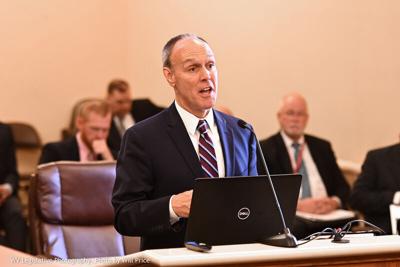Mitch Carmichael, the former secretary of economic development in West Virginia, is spearheading a new ad campaign urging President Donald Trump to preserve energy tax credits that he says are vital to creating jobs and growing business in West Virginia.
The clean energy tax credits in question were enacted by Congress under the 2022 Inflation Reduction Act. The U.S. House of Representatives voted last month, while considering the massive government spending bill, to cut them. West Virginia Republican Reps. Carol Miller and Riley Moore both voted in support of the bill.
The budget bill is now being considered by the U.S. Senate, where the energy tax credits have been central to conversations and debate. If the bill in its current form is passed, billions of dollars in incentives for clean energy and alternative energy projects in communities across the country would come to an end, potentially taking thousands of jobs along with them.
Carmichael is working on the new campaign as the executive director of Built For America, a group recently formed specifically to advocate for and protect the energy tax credits. He said the organization decided to
target Trump with its message instead of Congress because he is “certain” that the president will understand where the group is coming from.
“We believe that Donald Trump will do the right thing and will see the commonsense here,” Carmichael said. “These tax incentives represent basically the quintessential American Dream: Companies and individuals doing something well, investing in communities, and being rewarded for that. We believe that he will agree.”
Environmentally focused advocacy groups have been sounding the alarms regarding potential cuts to the tax credits for months, warning that — if they end — businesses, communities, consumers and the environment will be worse off.
“We’re not coming at this from a climate ideology,” Carmichael said. “We are focusing on how these tax credits are job makers, they’re essential to growing the manufacturing industry [in places like West Virginia] and they’re based on real, actualized outcomes — not politics.”
The credits at risk give companies incentives to either start new projects based around clean energy or convert current energy sources into clean energy, like solar, wind, geothermal and more. They also provide direct benefits to consumers through credits for buying electric vehicles or installing solar panels on a home.
Carmichael said in West Virginia these credits have already been instrumental in recruiting investments from companies for large manufacturing projects. Specifically, he pointed to the Berkshire Hathaway Energy Company project in Ravenswood, where a solar microgrid is powering the manufacturing of titanium products, and the Form Energy’s iron air battery manufacturing site in Weirton.
The Berkshire Hathaway project represented a $500 million investment in the Jackson County town. In Weirton, 300 people are currently employed at the Form Factory 1.
“Those investments happened in large part because of these tax credits,” Carmichael said. “We need more companies like this and we need more projects like this. These incentives help us make that happen.”
Carmichael, who also served as the state Senate president from 2017-2021, was clear that the point of these projects is not to “put coal [or natural gas] out of business.” Instead, he said, the investments allow the state to diversify its economy by exploring and inviting in industries previously not here.
And those industries, Carmichael said, create jobs — something he knows firsthand is difficult to do in the state.
In one of his first acts as governor in January, Patrick Morrisey announced his plans for a “Backyard Brawl” to make West Virginia economically and financially competitive with surrounding states. Though that plan so far has largely included cutting taxes and “red tape” in the hopes of incentivizing businesses to locate in West Virginia, Morrisey said in January that energy infrastructure will be core to the initiative.
This legislative session, a critical piece of legislation was passed to introduce a new industry — data centers — into the state.
House Bill 2014 created a certified microgrid program within West Virginia state code. Under the law, data centers will be allowed to form microgrids to generate their own power instead of hooking up to already existing utilities. Initially, the bill required that the microgrids be powered through renewable energy. But a change to the bill during session opened that up to any form of energy, including coal and natural gas.
The bill — and the new tax structure created within it for the distribution of taxes collected on such sites — have been somewhat controversial.
Residents in places like Tucker County, where a natural gas-powered data center is proposed, are upset that the legislation allows private companies to completely disregard local zoning ordinances, robbing them of any chance they’d have to protect their community from the worst consequences of industrial sites.
But Carmichael said he was excited to see what’s accomplished under the law. He said opportunities to grow the state’s economic resources is a good thing, and the tax credits would help to incentivize such growth.
“We all know what can be possible in West Virginia,” Carmichael said. “These tax credits make it so these large companies have more of a reason to look to us when they’re trying to grow their businesses. That’s what we need here.”



(0) comments
Welcome to the discussion.
Log In
Keep it Clean. Please avoid obscene, vulgar, lewd, racist or sexually-oriented language.
PLEASE TURN OFF YOUR CAPS LOCK.
Don't Threaten. Threats of harming another person will not be tolerated.
Be Truthful. Don't knowingly lie about anyone or anything.
Be Nice. No racism, sexism or any sort of -ism that is degrading to another person.
Be Proactive. Use the 'Report' link on each comment to let us know of abusive posts.
Share with Us. We'd love to hear eyewitness accounts, the history behind an article.